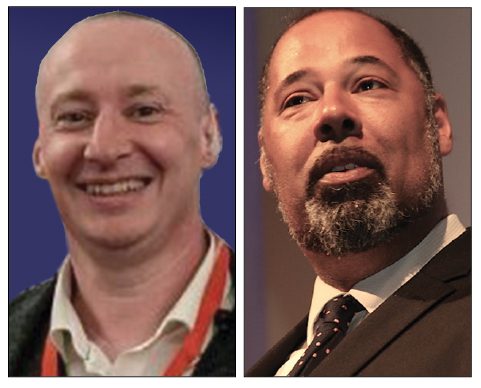
This article first appeared in the Summer 2024 issue of Searchlight
The 2024 UK election saw far-right candidates bomb spectacularly but, warns PAUL GALE, even as we delight at the squabbling and scrapping among the factions, we must not get too comfortable and must stay alert to the gains made by Reform UK
The British far right is struggling to work out its response to the July 4 general election, but confusion and bitter splits among our enemies should not blind anti-fascists to the dangers behind the headlines.
Both the National Front (NF) and the British National Party (BNP), the two main groups on the racist and fascist right since the late 1960s, have practically disappeared. The NF fought its first general election in 1970 and its last in 2015, with a peak of 303 candidates and a tally of almost 200,000 votes in 1979. The BNP (which began as a breakaway faction under former NF führer John Tyndall) fought its first general election in 1983 and its last in 2019, with a peak of 338 candidates and gaining more than 500,000 votes in 2010.
Today’s racist right is divided among four factions, three of which are now registered as political parties. Its leaders are mainly veterans of either the BNP, NF, or both – but their forces are a pale shadow of those earlier movements, and seem especially pathetic when compared to equivalent parties in Europe.
Old duds
Several of the old guard congregate in the British Democratic Party (BDP), a party that slowly developed out of the BNP’s collapse in the early 2010s. Some of its leading figures, such as former BNP councillor Jim Lewthwaite (below, right) and former NF chairman and BNP MEP Andrew Brons (below, top), have roots in “old school” fascism and are friendly with the nazi “intellectual” journal Heritage & Destiny, while others try to position the BDP as the populist voice of “white van man” in Kent and Essex.
Only four BDP candidates contested the general election: three of them polled below 1%, and two of these below 0.5%. On social media the party highlighted the only one of its candidates who achieved anything like a respectable vote, Frank Calladine (below, left) in Doncaster North, a defector from English Democrats (ED), whose 3.7% was mainly due to having no Reform UK opposition.

The lack of success has not stopped the British Democrats advertising themselves as the voice of “sensible” nationalism. What this means is that the party advocates fighting elections (even though it is not very good at it), rather than marches, stunts, incessant video streams, and physical training sessions preparing for the nationalist revolution.
The BDP’s “moderate” approach is undermined by the background of its co-founder and deputy chairman Brons, a veteran of Colin Jordan’s National Socialist Movement who wrote to Jordan’s wife and fellow nazi fanatic Françoise Dior discussing a new recruit who spoke about “bombing synagogues”, and whom Brons regarded as “well-intentioned”.
But its strategy after July 4 seems to amount to carrying on as before, fighting elections as and when it has financial resources and suitable candidates, and waiting for something to turn up.
In particular, the BDP anticipates the decline of Reform UK, and in this respect it might not be wrong. Lewthwaite and Brons have spent years pointing out that Nigel Farage uses radical rhetoric, while his actual policies and his close personal connections are with neo-Thatcherites.
In contrast to most of the far-right, which tends towards conspiracy theory and pessimism, the British Democrats think that time is on their side. Perhaps their biggest problem is that in a personal sense this is obviously untrue, with their leading figures either well into middle age or distinctly elderly.
Unkind rivals have pointed out that one reason the British Democrats largely eschew online streaming and social media is because neither Lewthwaite nor Brons have worked out how to use those new-fangled inventions called computers.
New duds
The second-oldest active force on the far right is Patriotic Alternative. PA’s leaders would like you to think they are a new and exciting arrival, but in fact they recently celebrated their fifth birthday. During those five years they have not managed to register as a political party, and several leading PA officials became so exasperated that last year they broke away to form what they call a more serious, electorally focused group called the Homeland Party.
A third faction within PA also broke away and (like Homeland, but strangely unlike its parent) quickly managed to register with the Electoral Commission as the National Rebirth Party (NRP), which is led by Alek Yerbury.
It is within what was once PA that the most intense arguments have exploded in the weeks after the general election.
Soon after the then Prime Minister Rishi Sunak announced a general election in the Downing Street rain, PA leader Mark Collett became embarrassed by his failure to register as a party, and was obviously worried that his rivals would score points against him (most importantly among donors) by fielding parliamentary candidates and perhaps achieving one or two decent results.
This was at the very start of the election campaign, when it certainly was not obvious that Farage was going to return to Reform UK, and when some far-right strategists thought that Reform’s election campaign might fizzle out. There was also a strong possibility that some of the online “influencers” (who inhabit a world that Collett is obsessed with), who were forced out of Reform UK during the months before the general election, might look for a new political home.
Unable to achieve credibility by himself (even after five years of spending donors’ money and broadcasting online several times a week), Collett cut a deal with Robin Tilbrook, the Essex solicitor who leads the English Democrats.
Flop, flop, flop
Tilbrook is no stranger to such deals. Although his own party is avowedly non‑racial and promotes “civic nationalism”, he has agreed several pacts with notorious racists during the past 20 years, ranging from Mark Cotterill (then of the England First Party) to Eddy Butler (the former BNP election strategist and East End thug).
This time, the deal involved Tilbrook endorsing four of Collett’s members as ED parliamentary candidates, but all four failed badly. Craig Buckley, a former UKIP candidate, managed 0.9% in Leigh and Atherton, Thomas Bryer 0.9% in Makerfield, Patrick McGrath 0.5% in Bolton West, and Matthew Darrington 0.3% in Newark.
A fifth openly racist ED candidate, prolific video streamer Steve Laws who has links both to PA and other factions, was another dismal failure at the ballot box, polling 0.4% in Dover and Deal.
These terrible results seem to have pushed Collett back into his previous bunker mentality. He now repeats his earlier pessimistic line that large parts of the UK are “finished”. Rather than wasting time with elections, PA should concentrate on building “patriotic communities”, withdrawing into their own little world.
This is an update for the streaming generation of ideas that have been around for decades, especially on the radical wing of American racism, where they often developed into terrorism and other criminality in groups such as Aryan Nations, White Aryan Resistance, the National Alliance, and The Order or Silent Brotherhood (Brüder Schweigen).
So it is no surprise that PA – the main British vehicle for such ideas in the 2020s – has also seen several of its leading activists jailed for terrorist offences or other criminal racism.
What was a surprise was to see Collett accept the challenge of an online “debate” in mid-July with his bitterest rival Yerbury, of PA breakaway NRP. It did not end well. Collett repeatedly lost his temper and, if his aim was to appear the more “statesmanlike” leader against the upstart Yerbury, he failed.
Worse still, within days of this debate, the feud between Collett’s and Yerbury’s supporters spiralled out of control, becoming so acrimonious that the owners of the Traditional Britain Group’s account at Telegram, where the feuding erupted, had to close down all access to comments.
The strategic political difference between Collett and Yerbury mainly involves whether to retreat or advance. Although his rivals see him as a fantasist, Yerbury maintains (not unreasonably) that any revolutionary movement must have high aspirations and ideological clarity, even if it bides its time.
Whether or not his NRP is strong enough to fight elections, Yerbury thinks that he and his colleagues need to be out there putting their case for a “pure”, hard-line racial nationalism. From one look at Yerbury it is pretty obvious who his political model is, although his storm troopers are not quite up to turning Leeds or Manchester into a 21st century Munich.
Yerbury’s biggest liability is his girlfriend Katie Fanning, a former official of UKIP’s youth wing, who specialises in winding up trouble on every online forum that will admit her. “Sanity’, as Ms Fanning is now known to both anti-fascists and her factional rivals, was the main culprit in the recent explosion of insults and threats on social media.
Claiming that she and her child had been threatened, she threatened to call the police and report some of her PA opponents, which led Collett to accuse her of being a “grass”.
Staying home
It is never a good look when a political party leader is reduced to using terminology associated with the criminal classes, and the biggest winner from the Collett-Yerbury feud might be Homeland Party leader Kenny Smith (below, left) who kept clear of the general election.

Perhaps Smith was prescient and perceived – even before Farage’s return – that Reform UK would collect almost the entire far-right vote. Or perhaps he was so embarrassed by Homeland’s own failure at the council elections in May that he was licking his wounds.
But, whatever the reason, Smith’s strategy is now looking to be the most rational of all Britain’s racist factions. Unlike Collett, Smith believes in electoral politics rather than building an online cult or remote white enclaves. Unlike Yerbury, he believes in building credibility through local elections rather than waiting for an opportunity to launch a march on Westminster without any local bases. But, unlike the British Democrats, he does not throw his efforts indiscriminately into any election where he can find a candidate.
Smith is targeting the right of the Tory Party and the strange underworld of racist streamers, former academics, and bloggers who operate slightly outside party politics, but who – until now – have thought themselves too grand for the type of racists who meet in scruffy pubs and leaflet council estates.
In September, Smith hopes to bring some of these characters together at a Homeland Party conference. Like others on the racist right, he hopes that Reform UK’s success has done enough to discredit the old party system, without building Reform itself into a long-term vehicle for protest voters.
What is already obvious is that Reform’s challengers within civic nationalism have drifted into conspiracy theory or have been taken over by “leaders” who are interested only in lining their own pockets. Searchlight has already documented UKIP’s terminal decline: as with the British Democrats, only one of their candidates polled respectably, and this was due to having no Reform UK opponent.
While David Kurten (above, right), leader of the Heritage Party, appears to be personally honest, he is useless as a political leader. He polled 1.5% on 4 July in Bognor Regis and Littlehampton, while his party’s other 40 candidates took between 0.1% and 0.7%.
Even presented with this open goal, the question is whether Farage has any serious ambition to turn Reform UK into a genuine political party, rather than a business under his and Richard Tice’s personal control. Smith’s gamble is that Farage has no such intention, and that Reform has neither the political will nor the ideological focus to build on the many strong results it achieved on 4 July.
For anti-fascists the task is to prevent either Farage’s Powellism or the semi-open Hitlerism of PA, Homeland and NRP from exploiting the inevitable difficulties and disappointments that will be felt in some communities during the next five years.
Right now, it is tempting simply to sit back and enjoy the ludicrous sideshow of British fascists kicking lumps out of each other. But we cannot assume that such self-defeating chaos will continue indefinitely.
Photos: main picture, PA candidates Craig Buckley and Thomas Bryer. Others clockwise from top left: Patrick McGrath (PA), Robin Tilbrook (EDs), Mark Collett (PA), Matthew Darrington (PA)





